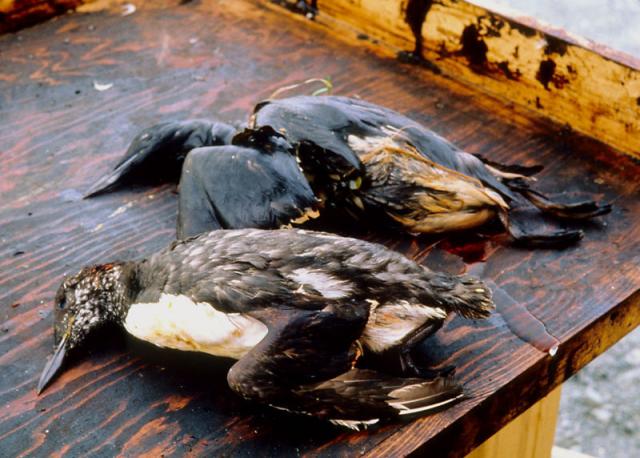75 groups from across Canada, the U.S. and Europe have signed a petition calling on the federal and Alberta governments to immediately phase out existing tailings lakes and deny any proposed project that would create new tailings lakes. Greenpeace issued the call-out last week, and 45 groups across Canada, including 23 Alberta-based groups, six U.S. groups, and one group from Europe have signed on to support a moratorium on destructive tar sands practices. To date, there have been over 600 signatories to the petition.
Greenpeace’s petition comes as European members of Parliament (MEPs) wrapped up their tour of the Alberta tar sands late last week. European members of Parliament were visiting to weigh in on the controversial dirty crude and were to report back on their findings regarding fuel legislation that could inhibit or impact the use of tar sands products. At stake is possible legislation and restriction on the importation of the dirty crude, or the labeling of it as “dirty” or “high carbon”.
The European Fuel Quality Directive, to be implemented January 1, 2011, would set EU-wide specifications for petrol, diesel and gas used in cars and other vehicles with the aim of protecting human health and the environment. The European Commission proposed mandatory monitoring and reporting of “lifecycle greenhouse emissions” from fuels, which is essentially an obligation for fuel suppliers to ensure that the greenhouse gas emissions from their fuels throughout their life cycle (from production to transport to use) are cut by 10% by 2020 (Article 7a). The Directive would prevent some 500 million tonnes of CO2 from being released into the atmosphere, but considerable disagreement remains over key elements in the proposed text.
The initial draft of the Directive discouraged the use of tar sands products by classifying them as dirty. Canadian diplomats responded by arguing that the Directive could be seen as a trade barrier. While European experts studied the issue, all reference to the tar sands was dropped from the new draft policy. Canada undoubtedly has a vested economic interest in ensuring the Directive’s text is favorable to the tar sands. Even though Europe is not a very significant market right now for Canadian tar sands, Europe’s policy decisions could inspire other nations to enact similar policies that would have more direct impacts on the export potential of oilsands.
Although Canada has hosted nearly 50 tours of the tar sands for various international delegations, the European tour was particularly important. Not only is the EU’s population of nearly 500 million a big market for oil products, but the EU enjoys a lot of political clout and influence. According to International and Intergovernmental Relations Minister Iris Evans, Canadian leadership fears that “if something happens in the EU and it is spread in other countries…we could have roughly one-third of the world’s population subscribing to regulation or legislation that mitigates against our oilsands”.
And while it represents a tiny market, dirty tar sands fuel is already finding its way to European pumps. A report from Greenpeace, Tar Sands in Your Tank: Exposing Europe’s Role in Canada’s Dirty Oil Trade finds that Europeans are filling up at the tank with the dirty fuel, perhaps unwittingly.
If the Directive were to label the tar sands oil as dirty or to restrict its import to EU countries, that could be devastating to oilsands industry profits.
Texas-based Valero Energy understands that cleary. The oil company that helped bankroll Prop 23 in California also has extensive ties to the tar sands. Valero and ExxonMobil are the main industry players enabling Alberta crude to enter the EU market. These oil superpowers want to see tar sands output increase dramatically in the coming years, so a European Fuel Quality Directive is seen as a threat to their bottom line.
Last week, European parliamentarians got the red carpet treatment, while the Alberta government swept the dirty facts under the rug. As the Edmonton Journal reported, European members of parliament were not given a true picture of the toxic tar sands. Delegation chairman Philip Bardbourn said the parliamentarians were not told about the recent David Schindler report that found that the tar sands boost the concentration of dangerous metals in the Athabasca watershed. The group was instead fed a bunch of industry and government greenwash, and told that the pollutants are naturally occurring. And what of those ducks killed by Syncrude?
According to a report by Friends of the Earth Europe, oil and gas companies such as ExxonMobil, Shell and BP have been lobbying forcefully against the EU’s Fuel Directive. They even called for Article 7a to be completely removed from the text, claiming that it was “premature”.
The Alberta government doesn’t want the rest of the world to question the clear environmental threat posed by tar sands development. Leadership mistakenly sees this as a PR problem to be finessed, rather than the real environmental threat it truly represents. If Alberta made a real effort to clean up the tar sands, the PR spin would be unnecessary. Instead, Evans is jetting off on a 12-day trip to Asia to sell the tar sands to the Asian market (at an estimated cost of over $20,000) while Premier Stelmach is headed to India to do much of the same.
While the ducks keep dying and oilsands emissions keep polluting the globe, Alberta’s spin campaign continues. How long will Alberta be beholden to the shortsighted profit motive of giant oil companies?
Subscribe to our newsletter
Stay up to date with DeSmog news and alerts






